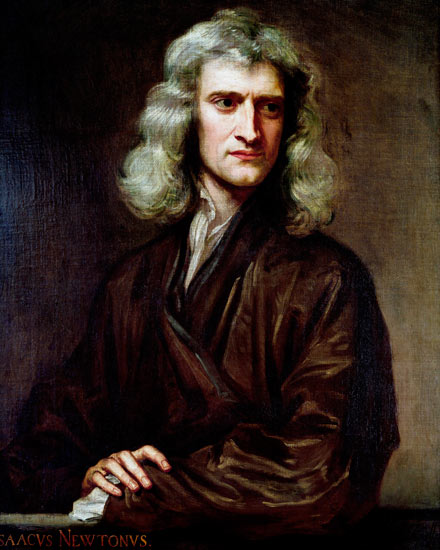Was Newton a scientist or a sorcerer?
http://www.guardian.co.uk/science/across-the-universe/2012/sep/21/isaac-newton-scientist-sorcerer
If he hadn't believed in spirits and 'active principles', Newton might not have conceived gravity in the mathematical form we still use today. Photograph: Corbis
Hot on the heels of Isaac Newton's apple appearing at the Paralympics comes a new celebration of his life and achievements. The Gravity Fields Festival begins on Friday in Grantham, Lincolnshire. For eight days, Newton's life and times will be commemorated by more than 100 events around the town, during what could become a biennial event.
Grantham lies close to Newton's birthplace, Woolsthorpe Manor, and contains the King's School, which the young Isaac attended. On Saturday at 3pm a blue plaque in his honour will be unveiled by the Astronomer Royal, Sir Martin Rees.
Often wrongly portrayed as a cold rationalist, Isaac Newton is one of history's most compelling figures. It is true that he was capable of the most precise and logical thought it is possible for a human to achieve: his three years of obsessive work that gave birth to the Principia, containing his theory of gravity, stand as the greatest achievement in science.
Just as certainly, though, he was also consumed with what we would now view as completely unscientific pursuits: alchemy and biblical prophesy.
NYC_SKP
(68,644 posts)Only an unrestrained imagination can make the discoveries Newton made.
Einstein didn't believe in magic, had a great imagination, and is at least as important as Newton in the realm of science.
TlalocW
NYC_SKP
(68,644 posts)Einstein, like Newton, questioned conventional science; they believed things though impossible by others- "magic", if you will.
![]()
DavidDvorkin
(19,485 posts)into new realms.
Newton said, "If I have seen further than others, it is because I have stood on the shoulders of giants."
NYC_SKP
(68,644 posts)Only an unrestrained imagination can make the discoveries Newton made.
And what you wrote is also true, but to the masses discoveries seem like magic.
That's all I was suggesting.
DavidDvorkin
(19,485 posts)No matter what it looks like to the masses, to the brilliant scientist, it looks like a deeper understanding of reality.
NYC_SKP
(68,644 posts)It takes both: deeper understanding AND the ability to imagine things that aren't yet understood.
There are scientists, true, who only ask questions and find answers.
And then there are inventors and innovators (who need also to be scientist of a sort) who imagine what others think impossible.
I call these impossible or improbable things "magic"
![]()
NYC_SKP
(68,644 posts)Magic, science, who cares?!
HopelesslyLiberal
(56 posts)So, he believed in spirits. So what?
RobertoRoberti
(30 posts)...is equally insulting to scientists and to sorcerers.
bemildred
(90,061 posts)Posteritatis
(18,807 posts)Aldo Leopold
(685 posts)Somebody had to take a photograph of the portrait. They probably would let somebody put the image directly on a flatbed scanner.
Corbis owns the image of the picture.